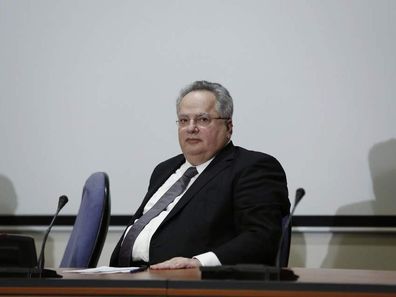 Nikos Kotzias, Minister of Foreign Affairs, Hellenic Republic
Nikos Kotzias, Minister of Foreign Affairs, Hellenic RepublicPhoto credit: Ekathimerini
There is not enough time for the Former Yugoslav Republic of Macedonia to join NATO at the alliance’s summit in July, Greek Foreign Minister Nikos Kotzias said on Wednesday during a lull in momentum in talks between Athens and Skopje on the “Macedonia” name issue.
“It is totally clear that FYROM will not join NATO [in July],” Kotzias told 24/7 radio station, noting that Skopje wants to hold a referendum on any deal reached, which would then have to go to the country’s Parliament, which would also have to approve changes to the national constitution, as demanded by Athens.
“If we are to have an agreement, we must agree on constitutional changes. So it will go back to the fall,” he said.
Meanwhile the Greek Foreign Ministry hit back at the European enlargement commissioner for saying a solution to the “Macedonia” name dispute is within reach, noting that the decision was not one for Brussels to make.
“Regarding the Former Yugoslav Republic of Macedonia, there is still a long way to go in covering the gap created by the backsliding in recent years,” the ministry said, noting that FYROM’s “stability and progress are of vital interest to Greece.”
“This is the seventh time the country has received a positive recommendation from the European Commission,” it said.
“Nevertheless, once again it must be made clear to all sides that the decisions are not made by the Commission but by the Council, where Greece has set out its positions clearly.”
Earlier, Enlargement Commissioner Johannes Hahn said he was optimistic a solution could be found in the coming weeks, adding that “the new government in Skopje is doing good work.”
Despite optimism earlier in the year that a deal on the name issue was within reach, the momentum in United Nations-mediated talks appears to have slowed down.
According to sources, the two sides have agreed on many peripheral matters but there is a major gap on core issues such as FYROM’s constitution and the scope of use of its new name.
Source:
Kathimerini
“It is totally clear that FYROM will not join NATO [in July],” Kotzias told 24/7 radio station, noting that Skopje wants to hold a referendum on any deal reached, which would then have to go to the country’s Parliament, which would also have to approve changes to the national constitution, as demanded by Athens.
“If we are to have an agreement, we must agree on constitutional changes. So it will go back to the fall,” he said.
Meanwhile the Greek Foreign Ministry hit back at the European enlargement commissioner for saying a solution to the “Macedonia” name dispute is within reach, noting that the decision was not one for Brussels to make.
“Regarding the Former Yugoslav Republic of Macedonia, there is still a long way to go in covering the gap created by the backsliding in recent years,” the ministry said, noting that FYROM’s “stability and progress are of vital interest to Greece.”
“This is the seventh time the country has received a positive recommendation from the European Commission,” it said.
“Nevertheless, once again it must be made clear to all sides that the decisions are not made by the Commission but by the Council, where Greece has set out its positions clearly.”
Earlier, Enlargement Commissioner Johannes Hahn said he was optimistic a solution could be found in the coming weeks, adding that “the new government in Skopje is doing good work.”
Despite optimism earlier in the year that a deal on the name issue was within reach, the momentum in United Nations-mediated talks appears to have slowed down.
According to sources, the two sides have agreed on many peripheral matters but there is a major gap on core issues such as FYROM’s constitution and the scope of use of its new name.
Source:
Kathimerini




 RSS Feed
RSS Feed